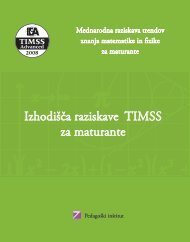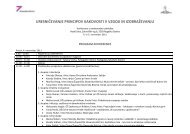112Šolsko <strong>polje</strong>, <strong>letnik</strong> <strong>XXII</strong>, številka 1–2LiteraturaAvsec, A. (2000). Področja samopodobe in njihova povezanost z realno inželeno spolno shemo. Doktorska disertacija, Ljubljana: Univerza v Ljubljani,Filozofska fakulteta, <strong>Od</strong>delek za psihologijo.Cantor, N., Sanderson, C. A. (1999). Life Task Participation and Well-Being:The Importance of Taking Part in Daily Life. V: Kahneman, D.,Diener, E., Schwarz, N. (ur.). Well-Being: The Foundations of HedonicPsychology, New York: The Russeell Sage Foundation, 230–243.Charlebois, K. (2007). Doing tomorrow what could be done today: An investigationof academic procrastination. Doctoral thesis, Boston: Bostoncollege.Conard, M. A. (2006). Aptitude is not enough: How personality and behaviorpredict academic performance. Journal of Research in Personality40, 339−346.Diener, E., Lucas, R. E. (1999). Personality and Subjective Well-Being. V:Kahneman, D., Diener, E., Schwarz, N. (ur.). Well-Being: The Foundationsof Hedonic Psychology, New York: The Russeell Sage Foundation,213–229.Diener, E., Lucas, R. E. (2000). Subjective Emotional Well-Being. V: Lewis,M., Haviland, J. M. (ur.). Handbook of Emotions, New York: Guilford,325–337.Diener, E. (1984). Subjective well-being. Psychological Bulletin 95, 542–575.Diener, E., Emmons, R. A., Larsen, R. J., Griffin, S. (1985). The SatisfactionWith Life Scale. Journal of Personality Assessment 49, 71–75.Ferrari, J. R. (1989). Reliability of academic and dispositional measures ofprocrastination. Psychological Reports 64, 1057–1058.Ferrari, J. R., Johnson, J. L., McCown, W. G. (1995). Procrastination andtask avoidance: Theory, research, and treatment, New York: PlenumPress.Fritzsche, B. A., Young, B. R., Hickson, K. C. (2003). Individual differencesin academic procrastination tendency and writing success. Personalityand Individual Differences 35, 1549–1557.Harriott, J., Ferrari, J. R. (1996). Prevalence of procrastination among samplesof adults. Psychological Reports 78, 611–616.Howell, A. J., Watson, D. C., Powell, R. A., Buro, K. (2006). Academic procrastination:The pattern and correlates of behavioural postponement.Personality and Individual Differences 40, 1519–1530.John, O. P., Srivastava, S. (1999). The Big Five Trait Taxonomy: History,Measurement, and Theoretical Perspectives. V: Pervin, L. A., John, O.P. (ur.). Handbook of Personality: Theory and Research, New York: TheGuilford Press, 102–138.
A. Videčnik, Nezadovoljni odlašalci: odlašanje pri študentihv povezavi s šolskim in študijskim uspehom ter zadovoljstvomKlassen, R. M., Krawchuk, L. L., Rajani, S. (2008). Academic procrastinationof undergraduates: Low self-efficacy to self-regulate predicts higherlevels of procrastination. Contemporary Educational Psychology 33,915–931.Komarraju, M., Karau, S. J., Schmeck, R. R. (2009). Role of the Big Five personalitytraits in predicting college students’ academic motivation andachievement. Learning and Individual Differences 19, 47–52.Lay, C. H. (1992). Trait procrastination and the perception of person-taskcharacteristics. Journal of Social Behavior and Personality 7, 483–494.Lay, C. H., Kovacs, A., Danto, D. (1998). The relation of trait procrastinationto the big-five factor conscientiousness: An assessment with primary-juniorschool children based on self-report scales. Personality andIndividual Differences 25, 187–193.Lounsbury, J. W., Sundstrom, E., Loveland, J. M., Gibson, L. W. (2003). Intelligence,“Big Five” personality traits, and work drive as predictorsof course grade. Personality and Individual Differences 35, 1231−1239.Milgram, N., Naaman, N. (1996). Typology in procrastination. Personalityand Individual Differences 20, 679–683.Paunonen, S. V., Ashton, M. C. (2001). Big Five predictors of academicachievement. Journal of Research in Personality 35, 78−90.Pavot, W., Diener, E. (1993). Review of the Satisfaction With Life Scale. PsychologicalAssessment 5 (2), 164–172.Rothblum, E. D., Solomon, L. J., Murakami, J. (1986). Affective, cognitive,and behavioral differences between high and low procrastinators. Journalof Counseling Psychology 33, 387–394.Schouwenburg, H. C., Groenewoud, J. T. (2001). Study motivation undersocial temptation; effects of trait procrastination. Personality and IndividualDifferences 30, 229–240.Schouwenburg, H. C., Lay, C. H. (1995). Trait procrastination and the BigFive factors of personality. Personality and Individual Differences 18,481–490.Schraw, G., Wadkins, T., Olafson, L. (2007). Doing the things we do: Agrounded theory of academic procrastination. Journal of EducationalPsychology 99, 12–25.Schwarz, N., Strack, F. (1999). Reports of Subjective Well-Being: JudgmentalProcesses and Their Methodological Implications. V: Kahneman,D., Diener, E., Schwarz, N. (ur.). Well-Being: The Foundations of HedonicPsychology, New York: The Russeell Sage Foundation, 61–84.Sočan, G. (2004). Postopki klasične testne teorije, Ljubljana: Filozofska fakulteta,<strong>Od</strong>delek za psihologijo.113
- Page 1 and 2:
Letnik XXII, številka 1-2, 2011Rev
- Page 3:
Letnik XXII, številka 1-2, 2011Rev
- Page 6 and 7:
Šolsko polje, letnik XXII, števil
- Page 9 and 10:
Od otroštva do novejših strategij
- Page 11:
E. Klemenčič in D. Štrajn, Od ot
- Page 15 and 16:
Razvoj epizodičnega spominav zgodn
- Page 17 and 18:
M. Rožman, Razvoj epizodičnega sp
- Page 19 and 20:
M. Rožman, Razvoj epizodičnega sp
- Page 22 and 23:
Šolsko polje, letnik XXII, števil
- Page 24 and 25:
Šolsko polje, letnik XXII, števil
- Page 26 and 27:
Šolsko polje, letnik XXII, števil
- Page 28 and 29:
26Šolsko polje, letnik XXII, štev
- Page 30 and 31:
28Šolsko polje, letnik XXII, štev
- Page 33 and 34:
Socialna kompetentnost in učnauspe
- Page 35 and 36:
M. Vidmar, Socialna kompetentnost i
- Page 37 and 38:
M. Vidmar, Socialna kompetentnost i
- Page 39 and 40:
M. Vidmar, Socialna kompetentnost i
- Page 41 and 42:
M. Vidmar, Socialna kompetentnost i
- Page 43 and 44:
M. Vidmar, Socialna kompetentnost i
- Page 45 and 46:
M. Vidmar, Socialna kompetentnost i
- Page 47 and 48:
M. Vidmar, Socialna kompetentnost i
- Page 49 and 50:
M. Vidmar, Socialna kompetentnost i
- Page 51 and 52:
M. Vidmar, Socialna kompetentnost i
- Page 53 and 54:
M. Vidmar, Socialna kompetentnost i
- Page 55 and 56:
M. Vidmar, Socialna kompetentnost i
- Page 57 and 58:
Stališča slovenskih učiteljev o
- Page 59 and 60:
M. Schmidt in B. Čagran, Stališč
- Page 61 and 62:
M. Schmidt in B. Čagran, Stališč
- Page 63 and 64: M. Schmidt in B. Čagran, Stališč
- Page 65 and 66: M. Schmidt in B. Čagran, Stališč
- Page 67 and 68: M. Schmidt in B. Čagran, Stališč
- Page 69 and 70: M. Schmidt in B. Čagran, Stališč
- Page 71 and 72: M. Schmidt in B. Čagran, Stališč
- Page 73 and 74: M. Schmidt in B. Čagran, Stališč
- Page 75 and 76: Zaznavanje agresivnih vedenj otroki
- Page 77 and 78: T. Vršnik Perše, A. Kozina in T.
- Page 79 and 80: T. Vršnik Perše, A. Kozina in T.
- Page 81 and 82: T. Vršnik Perše, A. Kozina in T.
- Page 83 and 84: T. Vršnik Perše, A. Kozina in T.
- Page 85 and 86: T. Vršnik Perše, A. Kozina in T.
- Page 87 and 88: T. Vršnik Perše, A. Kozina in T.
- Page 89 and 90: T. Vršnik Perše, A. Kozina in T.
- Page 91: T. Vršnik Perše, A. Kozina in T.
- Page 95 and 96: Nezadovoljni odlašalci: odlašanje
- Page 97 and 98: A. Videčnik, Nezadovoljni odlašal
- Page 99 and 100: A. Videčnik, Nezadovoljni odlašal
- Page 101 and 102: A. Videčnik, Nezadovoljni odlašal
- Page 103 and 104: A. Videčnik, Nezadovoljni odlašal
- Page 105 and 106: A. Videčnik, Nezadovoljni odlašal
- Page 107 and 108: A. Videčnik, Nezadovoljni odlašal
- Page 109 and 110: A. Videčnik, Nezadovoljni odlašal
- Page 111 and 112: A. Videčnik, Nezadovoljni odlašal
- Page 113: A. Videčnik, Nezadovoljni odlašal
- Page 117 and 118: Motivacija rednih in izrednihštude
- Page 119 and 120: O. Buček in B. Čagran, Motivacija
- Page 121 and 122: O. Buček in B. Čagran, Motivacija
- Page 123 and 124: O. Buček in B. Čagran, Motivacija
- Page 125 and 126: O. Buček in B. Čagran, Motivacija
- Page 127 and 128: O. Buček in B. Čagran, Motivacija
- Page 129: O. Buček in B. Čagran, Motivacija
- Page 133 and 134: (Post)suvereni diskurzi državljans
- Page 135 and 136: S. Bezjak, (Post)suvereni diskurzi
- Page 137 and 138: S. Bezjak, (Post)suvereni diskurzi
- Page 139 and 140: S. Bezjak, (Post)suvereni diskurzi
- Page 141 and 142: S. Bezjak, (Post)suvereni diskurzi
- Page 143 and 144: S. Bezjak, (Post)suvereni diskurzi
- Page 145 and 146: S. Bezjak, (Post)suvereni diskurzi
- Page 147 and 148: S. Bezjak, (Post)suvereni diskurzi
- Page 149 and 150: S. Bezjak, (Post)suvereni diskurzi
- Page 151 and 152: S. Bezjak, (Post)suvereni diskurzi
- Page 153 and 154: S. Bezjak, (Post)suvereni diskurzi
- Page 155 and 156: Evropski multikulturalizemin izobra
- Page 157 and 158: J. Pikalo in M. Banjac, Evropski mu
- Page 159 and 160: J. Pikalo in M. Banjac, Evropski mu
- Page 161 and 162: J. Pikalo in M. Banjac, Evropski mu
- Page 163 and 164: J. Pikalo in M. Banjac, Evropski mu
- Page 165 and 166:
J. Pikalo in M. Banjac, Evropski mu
- Page 167 and 168:
J. Pikalo in M. Banjac, Evropski mu
- Page 169 and 170:
J. Pikalo in M. Banjac, Evropski mu
- Page 171 and 172:
J. Pikalo in M. Banjac, Evropski mu
- Page 173 and 174:
J. Pikalo in M. Banjac, Evropski mu
- Page 175:
J. Pikalo in M. Banjac, Evropski mu
- Page 178 and 179:
176Šolsko polje, letnik XXII, šte
- Page 180 and 181:
178Šolsko polje, letnik XXII, šte
- Page 182 and 183:
180Šolsko polje, letnik XXII, šte
- Page 184 and 185:
182Šolsko polje, letnik XXII, šte
- Page 186 and 187:
184Šolsko polje, letnik XXII, šte
- Page 189:
V Epistemologijein problematikaviso
- Page 192 and 193:
190Šolsko polje, letnik XXII, šte
- Page 194 and 195:
192Šolsko polje, letnik XXII, šte
- Page 196 and 197:
194Šolsko polje, letnik XXII, šte
- Page 198 and 199:
196Šolsko polje, letnik XXII, šte
- Page 200 and 201:
198Šolsko polje, letnik XXII, šte
- Page 203 and 204:
Avguštin o temeljuin skupnosti vé
- Page 205 and 206:
J. Justin, Avguštin o temelju in s
- Page 207 and 208:
J. Justin, Avguštin o temelju in s
- Page 209 and 210:
J. Justin, Avguštin o temelju in s
- Page 211 and 212:
J. Justin, Avguštin o temelju in s
- Page 213 and 214:
J. Justin, Avguštin o temelju in s
- Page 215 and 216:
J. Justin, Avguštin o temelju in s
- Page 217 and 218:
J. Justin, Avguštin o temelju in s
- Page 219 and 220:
J. Justin, Avguštin o temelju in s
- Page 221 and 222:
J. Justin, Avguštin o temelju in s
- Page 223 and 224:
J. Justin, Avguštin o temelju in s
- Page 225 and 226:
J. Justin, Avguštin o temelju in s
- Page 227 and 228:
J. Justin, Avguštin o temelju in s
- Page 229 and 230:
Premisleki ob Nacionalnemprogramu v
- Page 231 and 232:
F. Pivec, Premisleki ob Nacionalnem
- Page 233 and 234:
F. Pivec, Premisleki ob Nacionalnem
- Page 235 and 236:
F. Pivec, Premisleki ob Nacionalnem
- Page 237 and 238:
F. Pivec, Premisleki ob Nacionalnem
- Page 239 and 240:
F. Pivec, Premisleki ob Nacionalnem
- Page 241 and 242:
F. Pivec, Premisleki ob Nacionalnem
- Page 243 and 244:
F. Pivec, Premisleki ob Nacionalnem
- Page 245 and 246:
F. Pivec, Premisleki ob Nacionalnem
- Page 247 and 248:
F. Pivec, Premisleki ob Nacionalnem
- Page 249 and 250:
F. Pivec, Premisleki ob Nacionalnem
- Page 251 and 252:
F. Pivec, Premisleki ob Nacionalnem
- Page 253 and 254:
F. Pivec, Premisleki ob Nacionalnem
- Page 255 and 256:
F. Pivec, Premisleki ob Nacionalnem
- Page 257 and 258:
F. Pivec, Premisleki ob Nacionalnem
- Page 259:
VI Povzetki/Abstracts
- Page 262 and 263:
260Šolsko polje, letnik XXII, šte
- Page 264 and 265:
262Šolsko polje, letnik XXII, šte
- Page 266 and 267:
264Šolsko polje, letnik XXII, šte
- Page 268 and 269:
266Šolsko polje, letnik XXII, šte
- Page 270 and 271:
268Šolsko polje, letnik XXII, šte
- Page 272 and 273:
Valerija Vendramin270Šolsko polje,
- Page 274 and 275:
Šolsko polje, letnik XXII, števil
- Page 277 and 278:
Knjižne recenzije/ReviewsZdenka Za
- Page 279 and 280:
Knjižne recenzije/Reviewssti. Če
- Page 281:
VIII Avtorji/Authors
- Page 284 and 285:
282Šolsko polje, letnik XXII, šte
- Page 286 and 287:
284Šolsko polje, letnik XXII, šte
- Page 288 and 289:
286Šolsko polje, letnik XXII, šte
- Page 291 and 292:
Navodila avtorjem/-icam člankov v
















